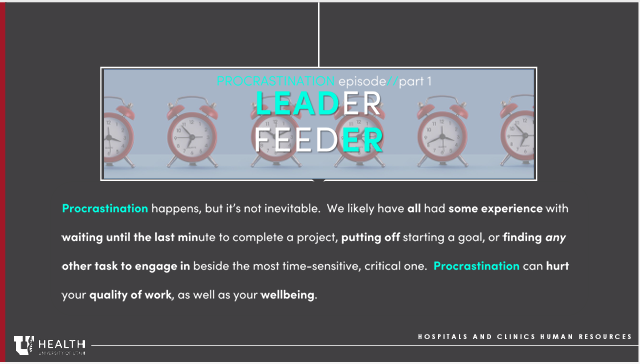Leader Feeders: Procrastination

Check out Jessica Burgett's Leader Feeder episodes on Procrastination.
rocrastination happens, but it's not inevitable. We likely have all had some experience with waiting until the last minute to complete a project, putting off starting a goal, or finding any other tasks to engage in besides the most time-sensitive, critical one. Procrastination can hurt your quality of work, as well as your wellbeing.
Procrastination is a human condition. When a task is difficult, boring, frustrating, vague, unstructured, lacking personal meaning and/or is not intrinsically rewarding, then the more likely we are to avoid starting the work altogether. If minimized, procrastination can be less problematic to our personal professional goals and progress.
The problem
Procrastination is a common challenge that many of us face, especially when we are stressed, fatigued, and overwhelmed. These feelings can trigger our tendency to delay tasks, a behavior exacerbated in specific workplace environments. When stressors mount, procrastination becomes a coping mechanism, leading to a cycle that's hard to break.
Engaging in procrastination often results in guilt and shame, emotions that can temporarily motivate us but are ineffective in the long run. These negative feelings linger, providing no resolution to the root cause of the behavior. Additionally, if procrastinators occasionally find success despite their delays, they might misattribute it to their procrastination, reinforcing the habit further.
How did we get here?
Understanding the origins of procrastination requires delving into our psychological and behavioral patterns. Tasks and goals frequently demand more effort and time than we initially anticipate. Without solid systems, habits, and routines, we're prone to mismanaging these challenges. Furthermore, our aversion to negative emotions like anxiety, boredom, or frustration often leads us to avoid tasks that evoke these feelings.
Moreover, our flawed thinking plays a role. The efficient completion of tasks tests the accuracy of our cognitive patterns. Our brains struggle to comprehend the future's benefits compared to the immediate rewards of the present moment. This inherent bias often influences our decision-making, pushing us further into the procrastination trap.
Strategies to overcome procrastination
Strategy #1: Get bite-sized
When we are faced with a dreaded task or goal, we often assume we have to be perfect off the bat, or we do too much too soon. Slow down and approach your task or goal at a pace and in segments that serve you well.
1. Start with a small behavior change.
When behavior is small and manageable, it doesn't require the same degree of motivation as large, long-term, and complex goals and shifts in behavior.
-
Create tiny habits that are consistently repeatable and doable.
-
Resetting daily habits can assist you in tackling more difficult behaviors down the line.
Example
- Goal = complete certificate program
- Smallest first step = download upcoming year's course calendar, hang above desk.
2. Identify the first step and its system.
Find the very smallest first step possible that would translate to progress, as well as how you will see this step through.
-
Make your first step feel as effortless and minimal as possible.
-
Low effort exertion to start means increased probability for initial success and continued commitment moving forward.
Strategy #2: Schedule deep, focused work
It's unreasonable to think you might enjoy or be productive during long, enduring work sessions. Our brains aren't designed to engage in challenging work across consecutive hours. In fact, humans tap out around 90-minutes; therefore, consider utilizing short work sessions.
1. Limit yourself to short bouts of work.
When we think of deep, focused work, we often think of long, marathon sessions of work. Deep work can be quick as long as it recruits your full attention and focus.
- Schedule uninterrupted work for 10 minutes today, then repeat the process the following day.
2. Get disconnected.
Getting started is often the most difficult part of any task. However, once inertia is on our side, the task often proves less difficult than we initially imagined. To help produce momentum:
-
Make getting started as smooth and easy as possible.
-
Remove any and all distractions (e.g., email, social media, texting, TV) to give yourself no choice but to get to work.
Strategy #3: Address emotions
Procrastination is not logical, rather it's the result of the emotional part of your brain (i.e., the limbic system). Deactivating the emotional part of your brain and turning on the logical part (i.e., prefrontal cortex) is essential in minimizing procrastination.
Example
"I've been frustrated with my public speaking performances in the past, which is causing doubt and impacting my preparation. This is normal. I've had practice and learned through my experiences."
1. Extend self-compassion.
Certain emotions we feel about a particular task or goal may be due to previous experiences.
-
Engage in compassionate self-talk to shift your emotions.
2. List the costs of procrastination.
People don't like to win as much as they hate to lose. Especially in larger and more complex tasks, listing the costs associated with avoiding a task can help put things into perspective and forces us to face reality.
-
Ask yourself, "What realistically can I expect to gain by starting, working on, and completing this task?"
-
Ask yourself, "What realistically am I likely to give up, forgo, or lose by not starting, working on, or completing this task?"
Strategy #4: Build productive thought patterns
When we subconsciously inflate the stakes surrounding our goals or tasks, the likelihood to procrastinate increases. When we perceive our decisions to have deeply associated consequences, we may get paralyzed to act in productive and progressive ways.
1. Learn to tolerate (and appreciate) difficult, friction-filled work.
People tend to interpret challenging and friction-filled work as a sign of doing things "wrong." Frustration signals the potential for learning to occur, as long as one doesn't give up too soon.
-
Each day, commit to working on something that causes psychological and emotional discomfort because it is just beyond your current capabilities.
-
Find a way to celebrate your progress through strenuous effort and accomplishing something you couldn't/haven't before.
Example
You have the task of writing a quarterly report with no template/structure.
First, outline a workflow. Then, make a game of it and see how many steps within the workflow you can accomplish in a 20-minute period.
2. Reverse procrastination triggers
When we reframe how we think about tasks, they can move from averse to attractive.
-
Identify negative perceptions about the task and challenge them.
-
Focus on the potential positive outcomes of completing the task.
While procrastination is a natural inclination, it can be effectively managed. By breaking tasks into smaller steps, scheduling focused work sessions, addressing emotions with self-compassion, and reframing perspectives, individuals can overcome procrastination. Embracing discomfort as a part of growth and celebrating progress are key elements in this journey. With these strategies, procrastination's impact can be minimized, leading to increased productivity and overall well-being.
Jessica Burgett
Negative self-talk lurks as a formidable threat, silently undermining our confidence and stifling our potential. Recognizing its dangers, Leadership Training Specialist Jess Burgett equips us with essential strategies to combat unhelpful internal dialogues, turning our thoughts into powerful allies for a more positive and successful life.
Understanding the dangers of toxic productivity is crucial in safeguarding mental well-being and fostering a balanced life amid today's demanding work culture. Jess Burgett, Leadership Training Specialist, shares a healthier approach to not only shield against burnout but also empowers individuals to achieve sustainable success and fulfillment.
The annual Operating Budget is a structured process that pairs frontline manager expertise with powerful financial forecasting tools to help the organization stay on track. The Central Finance Team’s Casey Moore and Robert Dickson demystify the process to help you navigate budget season.
